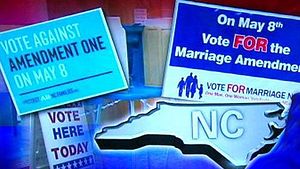RALEIGH, North Carolina, May 9, 2012

|
The state already banned gay marriage, so the amendment defining marriage as between a man and a woman did nothing to change that. Still, the amendment went beyond current restrictions -- by banning same-sex civil unions as well. The amendment voters passed Tuesday with roughly 61 percent support will seal the door on both kinds of partnerships.
Nationally, the vote was closely watched at a time when gay marriage is returning to the political conversation. President Obama has faced pressure in recent days to make his gay marriage stance more clear, after top officials in his administration have either endorsed gay marriage or spoken in support of it.
Obama has said his view is "evolving." After the North Carolina vote, Obama campaign spokesman Cameron French said in a Tuesday statement that the ban on same-sex unions is "divisive and discriminatory." The campaign said Obama was "disappointed" in the vote.
But supporters of the amendment heralded the outcome. State GOP Chairman Robin Hayes called the vote a "defining day for traditional values in North Carolina, and I'm proud to have voted for protecting marriage."
John Dinan, a political science professor at Wake Forest University who writes an annual review of state constitutional amendments, said the amendment could affect several areas.
For example, a handful of local governments provide benefits to employees who are involved in same-sex relationships. In Michigan, the state's highest court ruled that an amendment did affect those benefits, Dinan said. But in North Carolina, officials in Durham and Orange counties have said they don't expect to have to eliminate those benefits because of the amendment, he said.
Opponents had said they feared the law could affect domestic violence protections, some of which refer to people who live together. Dinan said he doubted that would happen, although Ohio had a three-year court fight over the issue before the Supreme Court ruled the laws weren't affected.
Some voters who opposed the amendment weren't that concerned with the practical effects of the amendment, but more with how it makes North Carolina look.
The amendment was unnecessary, said Sam Stone, 70, of Raleigh, who voted against it, along with his wife, Virginia, 66.
"Doing this amendment makes it seem more mean-spirited," he said Tuesday as he went to the polls.
Shane Colwell, who's studying at Southeastern Baptist Theological Seminary in Wake Forest, said the amendment clarified the definition of marriage.
"I'm a born-again Christian, and I just believe the Bible is clear that marriage is for one man and one woman," he said. "It doesn't mean that anybody's less equal than anybody else. I just think that marriage is one man and one woman."
Supporters of the amendment responded with marches, television ads and speeches. The Rev. Billy Graham, 93, was featured in full-page newspaper ads backing the amendment.
North Carolina is the 30th state to pass a constitutional amendment banning gay marriage. Six states -- all in the Northeast except Iowa -- and the District of Columbia allow same-sex marriages. In addition, two other states have laws that are not yet in effect and may be subject to referendums.
Both sides said the hard-fought battle had brought new voters who will be active in other issues.
"I think we've built a huge coalition across North Carolina of people who believe godly values," said Tami Fitzgerald, head of the pro-amendment group, Vote FOR Marriage NC. "And I believe that speaks well for people in our state who have somewhat been a silent majority in the past and I think you can expect them to be very active in the future, especially when they see the impact of their grassroots efforts."
But even the state House Speaker, who supported the amendment, expressed reservations about how long it would survive. Speaker Thom Tillis said he expects the amendment to be reversed within 20 years as today's young adults age.
While legislators can easily undo a state law, it's much harder to reverse a constitutional amendment, Dinan said. The latter requires a three-fifths vote in both legislative houses, then voter approval.
"One can't rule that out," he said. "But it's become more difficult to make that change now."
The Associated Press contributed to this report.
